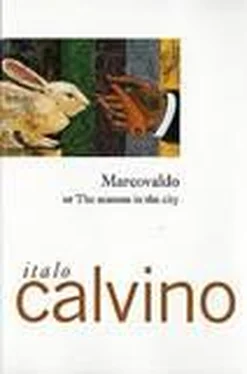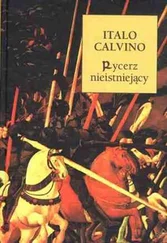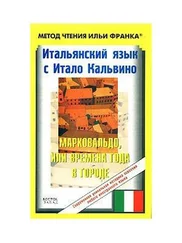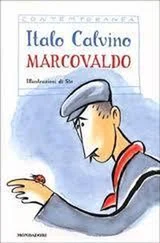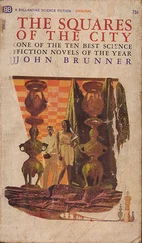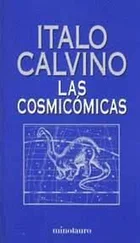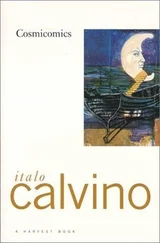At that moment he saw the bridge; and from the statues and lamps that adorned the railings, from the breadth of the arches that touched the sky, he recognized it: he hadn't realized how far he had come. And as he entered the opaque region of shade that the arches cast, he remembered the rapids. About a hundred yards beyond the bridge, the riverbed made a drop; the barge would drop down the falls and overturn, and he would be smothered by the sand, the water, the barge, with no hope of emerging alive. Still, even at that moment, his greatest concern was the sand cure, whose beneficent effects would be promptly lost.
He waited for the plunge. And it came: but it was a thud coming upwards from below. On the brink of the falls, in that dry season, shoals of mud had collected, some greening with slender clumps of cane and rushes. The barge ran aground, on all its flat keel, flinging up the whole load of sand and the man buried in it. Marcovaldo found himself hurled into the air as if by a catapult, and at that moment he saw the river below him. Or rather: he didn't see it at all, he saw only the teeming crowd of people who filled the river.
On this Saturday afternoon, a great throng of swimmers crowded that stretch of river, where the shallow water came only up to the navel; children wallowed in it, whole classes of them, and fat women, and gentlemen who did the deadman's float, and girls in bikinis, and young toughs who wrestled with each other, and mattresses, balls, life-savers, inner-tubes, row boats, kayaks, rubber boats, motor boats, life-saving boats, yawls from yacht clubs, fishermen with nets, fishermen with rods, old women with parasols, young ladies in straw hats, and dogs, dogs, dogs, from toy poodles to Saint Bernards: you couldn't see even an inch of the river's surface. And Marcovaldo, as he flew, was uncertain whether he would fall onto a rubber mattress or into the arms of a Junoesque matron, but of one thing he was certain: not even a drop of water would touch him.
The joys of that round and flat vessel, or lunch-box, known as the "pietanziera", consist first of all in its having a screw-on top. The action of unscrewing the cover already makes your mouth water, especially if you don't yet know what is inside, because, for example, it's your wife who prepares the vessel for you every morning. Once the box is uncovered, you see your food packed there: salami and lentils, or hard-boiled eggs and beets, or else polenta and codfish, all neatly arranged within that circumference as the continents and oceans are set on the maps of the globe; and even if the food is scant it gives the effect of being substantial and compact. The cover, once it has been removed, serves as a plate, and so there are two receptacles and you can begin to divide the contents.
Marcovaldo, the handyman, having unscrewed the lid of his box and swiftly inhaled its aroma, grabs the cutlery that he has always carried in his pocket, wrapped in a bundle, ever since he began eating his noon meal from the lunchbox instead of returning home. The fork's first jabs serve to rouse those benumbed victuals a bit, to give the prominence and attraction of a dish just set on the table to those foods that have been cramped inside there for so many hours. Then you begin to see that there isn't much, and you think: "Best to eat it slowly." But, rapid and ravenous, the first forkfuls have already been raised to the mouth.
The immediate sensation is the sadness of eating cold food, but the joys promptly begin again as you find the flavors of the family board transported to an unusual setting. Marcovaldo has now begun chewing slowly: he is seated on a bench by an avenue, near the place where he works; since his house is far away and to go there at noon costs time and tram tickets, he brings his lunch in the box, bought for the purpose, and he eats in the open air, watching the people go by, and then he refreshes himself at a drinking fountain. If it's autumn and the sun is out, he chooses places where an occasional ray strikes; the shiny red leaves that fall from the trees serve him as napkins; the salami skins go to stray dogs, who are quick to become his friends; and the sparrows collect the bread crumbs, at a moment when no one is going past in the avenue.
As he eats, he thinks: "Why am I so happy to taste the flavor of my wife's cooking here, when at home, among the quarrels and tears, the debts that crop up in every conversation, I can't enjoy it?" And then he thinks: "Now I remember. These are the leftovers from last night's supper." And he is immediately seized again by discontent, perhaps because he has to eat leftovers, cold and a bit soured, perhaps because the aluminum of the lunch-box gives the food a metallic taste, but the notion lodged in his head is: The thought of Domitilla manages to spoil my meals even when I'm far away from her.
At that point, he realizes he has come almost to the end, and again this dish seems to him something very special and rare, and he eats with enthusiasm and devotion the final remains on the bottom of the plate, the ones that taste most of metal. Then, gazing at the empty, greasy receptacle, he is again overcome by sadness.
Then he wraps everything up, puts it in his pocket, and stands; it's still early to go back to work; in the big pocket of his heavy jacket the cutlery drums against the empty lunch-box. Marcovaldo goes to a wine-shop and has them pour him a glass, filled to the brim; or else to a café where he sips a little cup of coffee; then he looks at the pastries in the glass case, the boxes of candies and nougat, persuades himself that he doesn't want any, that he doesn't want anything at all; for a moment he watches the table-football to convince himself that he wants to kill time, not appetite. He goes back into the street. The trams are crowded again; it is almost the hour to return to work, and he heads in that direction.
It so happened that his wife, Domitilla, for personal reasons, bought a great quantity of sausage and turnips. And for three evenings in a row, Marcovaldo found sausage and turnips for supper. Now that sausage must have been made of dog meat; the smell alone was enough to kill your appetite. As for the turnips, this pale and shifty vegetable was the only one Marcovaldo had never been able to bear.
At noon, there they were again: his sausage and turnips, cold and greasy, in the lunch-box. Forgetful as he was, he always unscrewed the lid with curiosity and gluttony, never remembering what he had eaten for supper the previous night; and every day brought the same disappointment. The fourth day, he stuck his fork into it, sniffed once again, rose from the bench, and holding the open lunch-box in his hand, walked absently along the street. The passers-by saw this man carrying a fork in one hand and a plate of sausage in the other, apparently unable to bring himself to raise the first forkful to his mouth.
From a window a voice said: "Hey, mister!"
Marcovaldo raised his eyes. On the mezzanine floor of a grand villa, a boy was standing at a window, his elbows on the sill, where a dish had been set.
"Hey, mister! What are you eating?"
"Sausage and turnips!"
"Lucky you," the boy said.
"Mmm…" Marcovaldo replied, vaguely.
"Imagine! I'm supposed to eat fried brains…" Marcovaldo looked at the dish on the sill. There were fried brains, soft and curly as a pile of clouds. His nostrils twitched.
"What? Don't you like brains?" he asked the little boy.
"No. They locked me up in here to punish me, because I wouldn't eat it. But I'll throw it out of the window."
"And you like sausage?"
"Oh, yes, it looks like a snake… We never eat it at our house…"
"Then you give me your plate and I'll give you mine."
"Hurrah!" The child was overjoyed. He held out to the man his porcelain plate with heavy silver fork, and the man gave him the lunch-box with the tin fork.
Читать дальше
